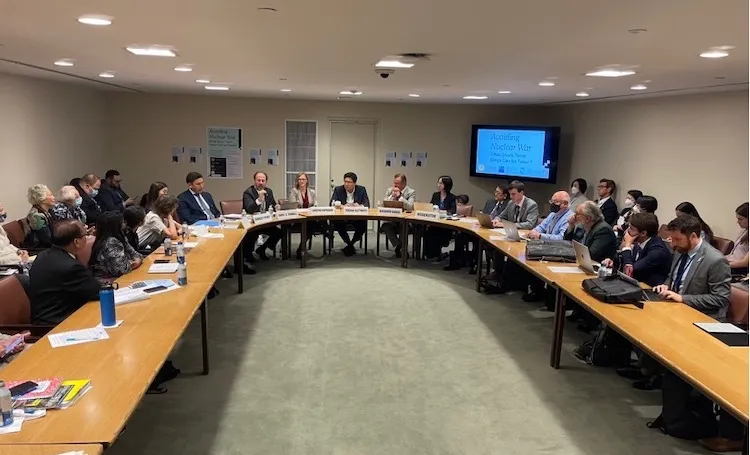By Thalif Deen
UNITED NATIONS (IDN) — When academics, anti-nuclear peace activists and civil society organisations (CSOs) met at the United Nations earlier this month to discuss the growing threats of a nuclear war worldwide, one of the underlying themes was captured in the title: “Avoiding Nuclear War: What Short-Term Steps Can be Taken?”
The discussion included a call on the world’s five major nuclear powers—the UK, US, France, Russia and China, all permanent members of the UN Security Council—to commit “No First Use” of nuclear weapons. JAPANESE
The other four nuclear powers—India, Pakistan, Israel and North Korea—were expected to follow suit.
Professor Alexander Harang, International Peace and Understanding, Peace Research Institute, Oslo, said since March this year, he has devoted most of his time to address the need for “No First Use” policies.
“It’s an old theme, but the times we’re living in have made No First Use more relevant than ever before,” he said.
“As we’ve heard from almost every state throughout this week of General Debate here at the NPT Review Conference, we are living in dangerous times. The threshold for actual use of nuclear weapons has been dramatically lowered over the last months”.
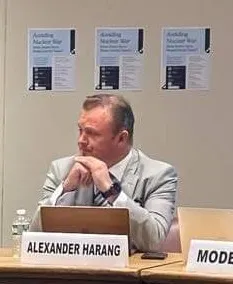
“If we fail in addressing this problem effectively, all our other efforts for peace and disarmament may be in vain,” he warned.
Professor Harang also pointed out that declaring “No First Use” policies by the nuclear-armed states may also prove to be the most effective way to re-establish trust within the UN disarmament machinery and regain momentum for multilateral disarmament.
“We should also understand No First Use as something that is actually possible to agree upon in the times we are living. This is something achievable. And these are the main reasons why we need to focus on No First Use right now,” he declared.
The “side event”, which took place August 4 in the margins of the three-week-long Tenth Review Conference on the Treaty on the Non-Proliferation of Nuclear Weapons (NPT), scheduled to conclude August 26, was co-sponsored by the Permanent Mission of the Republic of Kazakhstan to the UN, Soka Gakkai International (SGI), Arms Control Association, the Council on Strategic Risks, the Institute of World Economics and Politics and the International Peace and Understanding Project.
The tone was set by SGI President Daisaku Ikeda, a Buddhist philosopher, who in a statement ahead of the conference, called on the five major nuclear-weapon states to declare they will never be the first to use nuclear weapons in a conflict: the principle of “No First Use”.
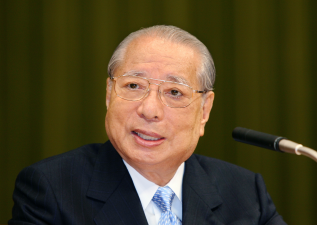
“Today the risk that nuclear weapons will be used is at its highest level since the Cold War,” he said.
A passionate campaigner for nuclear abolition for over 60 years, he urged the United States, Russia, the United Kingdom, France and China—to give substance to a joint statement made by their leaders on January 3, 2022, that “a nuclear war cannot be won and must never be fought,” by declaring policies of “No First Use”.
Adoption of a policy of “No First Use” can significantly enhance the global security climate, he argued.
To cite an example, he pointed out, that when China and India engaged in border clashes in June 2020, that resulted in dozens of casualties, their standing commitments to “No First Use” helped contain tensions and acted as a brake on escalation.
As more states adopt this principle of “No First Use”, the norm that nuclear weapons are weapons that must never be used will be further strengthened, reducing the incentive to build up nuclear arsenals, he noted.
Further, this could help disrupt the vicious cycles of nuclear proliferation in which heightened nuclear threats induce more states to seek their own nuclear weapons, said Dr Ikeda, whose organisation represents a diverse Buddhist community of 12 million people that promotes peace, culture and education, and is also an NGO in consultative status with the United Nations.
Nor would the positive feedback generated by adopting “No First Use” be limited to the security realm. Defusing the system of interlocking nuclear threats that have exacerbated tensions and divisions globally would free the resources currently expended on the nuclear competition so they could be used to protect the lives, livelihoods and dignity of all against such threats as the COVID-19 pandemic and climate change.
“I strongly call on all states parties to seize the opportunity of this NPT Review Conference to include in the Final Document commitments to a policy of No First Use by the nuclear-weapon states, support for this principle by all states parties and the extending of negative security assurances to all non-nuclear-weapon states, thereby promoting the transition to a new security paradigm.”
At a press conference in Hiroshima on August 6, UN Secretary-General António Guterres pursued the same theme when he told reporters that countries with nuclear weapons “must commit to the no first use of those weapons because if nobody is the first to use, there would simply be no nuclear confrontation”.
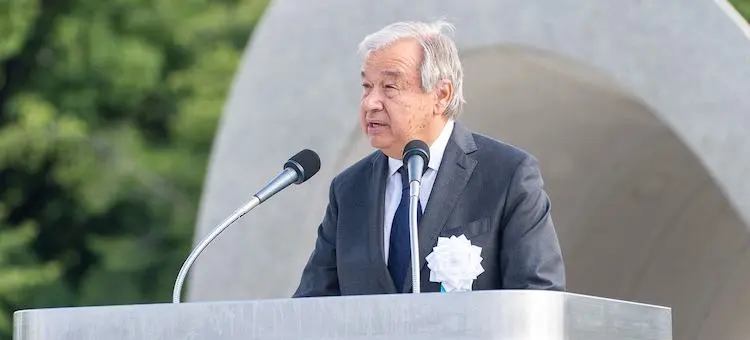
Especially today, he said, when nuclear risk is once again growing around the world.
“When stockpiles are being upgraded. And when almost 13,000 of these doomsday weapons still exist. The lessons of Hiroshima and Nagasaki are clear.”
Nuclear weapons have no place on our planet, he said, “It’s time to lift the cloud of nuclear annihilation, once and for all. It’s time to proliferate peace”.
In his opening remarks, the Permanent Representative of Kazakhstan to the United Nations, Ambassador Magzhan Ilyassov, said the world continues to be just as precarious now, as in 1945, because of the threat of nuclear weapons—the deadliest of all scourges, to avert which, the United Nations was founded 77 years ago.
However, this dread persists, despite the relentless efforts of the UN and the international community to eliminate nuclear weapons.
“The turmoil and havoc of the last two and half years, seen in all countries across the economic spectrum, should therefore not be further aggravated by nuclear warfare or pollution of any kind,” he noted.
“Peace, disarmament, justice, sustainable development and environmental protection are the pre-requisites for human survival and wellbeing,” the ambassador said.
Despite the challenges that NPT has encountered, it remains one of the key cornerstones of the international security architecture and global non-proliferation regime.
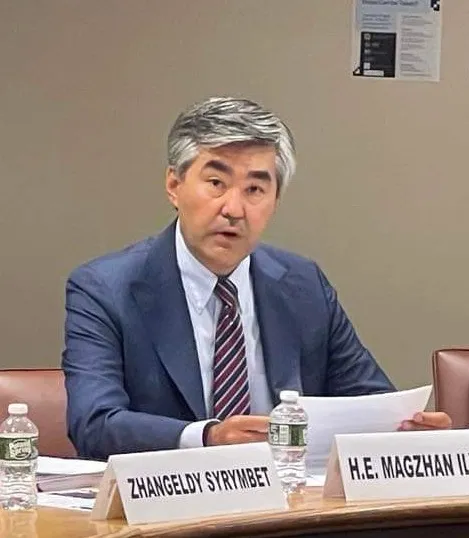
The Tenth NPT Review Conference is most timely “and compels us to make a critical decision for human security and progress to avoid a plunge into unforeseen disasters”.
Kazakhstan will continue to work with others to seek a speedy and safe recovery to ensure enduring stability and security for all. It is a long-cherished objective it has upheld consistently since its independence by advocating for an international effort to achieve a nuclear-weapon-free world, said Ambassador Ilyassov.
“We are well aware that as long as there is a place in the world for nuclear weapons, there is simply no absolute guarantee of their non-use. We are now reopening diplomacy, and its potential must be used to the fullest during this Conference.
We hope that we will manage to break the deadlock soon and see a new bright and hopeful horizon for humanity,” he declared.
Christine Parthemore, Chief Executive Officer of the Council on Strategic Risks (CSR), said the potential for nuclear confrontation is rising.
“There are numerous drivers of this problem—geopolitical tensions are rising, we lack sufficient momentum in shaping future arms control steps, the world is grappling with the effects of the climate crisis and pandemic, and countless pressures.”
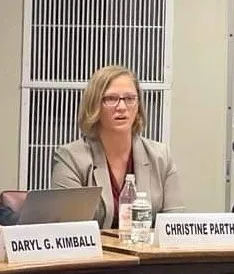
It’s important not to overlook another driver—that is that several nuclear-armed nations have or are considering increasing prominence for nuclear capabilities that may lower the threshold for such weapons being used, capabilities that increase the risks of miscalculations, or both, she added.
This includes nuclear weapons that some would label as low-yield and sub-strategic. It also includes nations possessing dual-capable systems that can carry both nuclear and conventional payloads and which may be difficult to differentiate in a crisis.
“I started seeing an increased focus on these types of capabilities during my time in the Pentagon, and this drives the framing of much of our work at CSR, where we’ve worked with many nations and others to explore steps to reduce the risks that nuclear weapons will be used, and return nuclear-armed states toward paths of restraint, responsibility, and progress toward NPT commitments,” said Parthemore.
“We recommend that nuclear-armed nations should consider any steps that show progress toward the following 3 objectives:
1) Halting consideration of new & novel nuclear weapon capabilities that are not part of today’s landscape
2) Avoiding actions that introduce even greater ambiguity in an already complex security environment, and starting to reduce such ambiguity, and
3) Avoiding and reducing entanglement between conventional and nuclear forces
There are many forms that such steps could take, and many of these have been explored in works by my organisation, other NGOs, UNIDIR, and others.”
Examples could include:
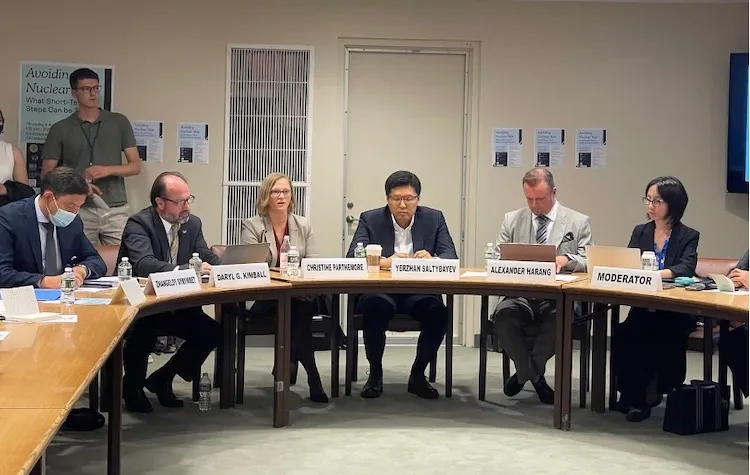
- Agreements to avoid the pursuit of dual-capable weapon systems that could carry conventional and nuclear payloads—either specific weapons or broader classes, such as cruise missiles
- A nuclear-focused successor to the INF treaty, given that numerous nations have expressed interest in maintaining only conventional intermediate-range ground-launch systems
- Moratoriums or agreements not to deploy specific types of nuclear capabilities in specific regions or not to deploy them at all.
Daryl G. Kimball, Executive Director of the Washington-based Arms Control Association (ACA) and Yerzhan Saltybayev of the Institute of World Economics and Politics also participated in the discussion. The moderator was Anna Ikeda, SGI. [INPS Japan/IDN — 07 August 2022]
Photo credit: Katsuhiro Asagiri. IDN-INPS Multimedia Director


